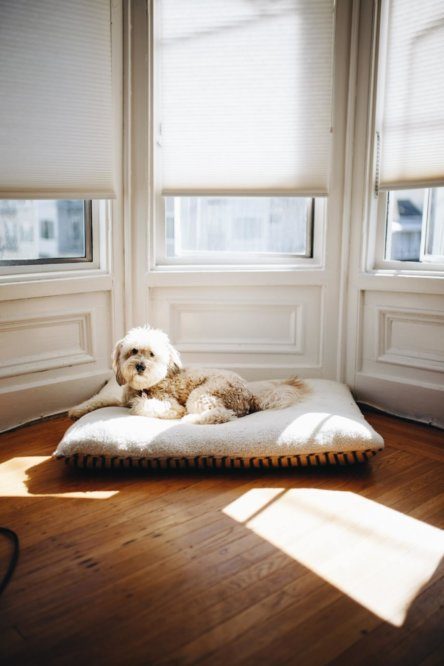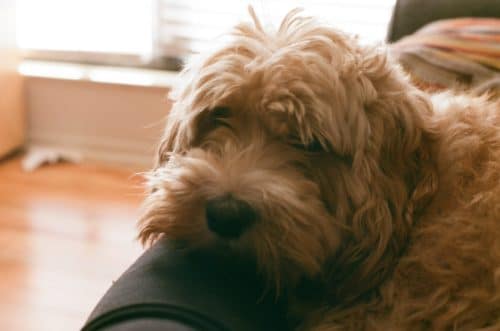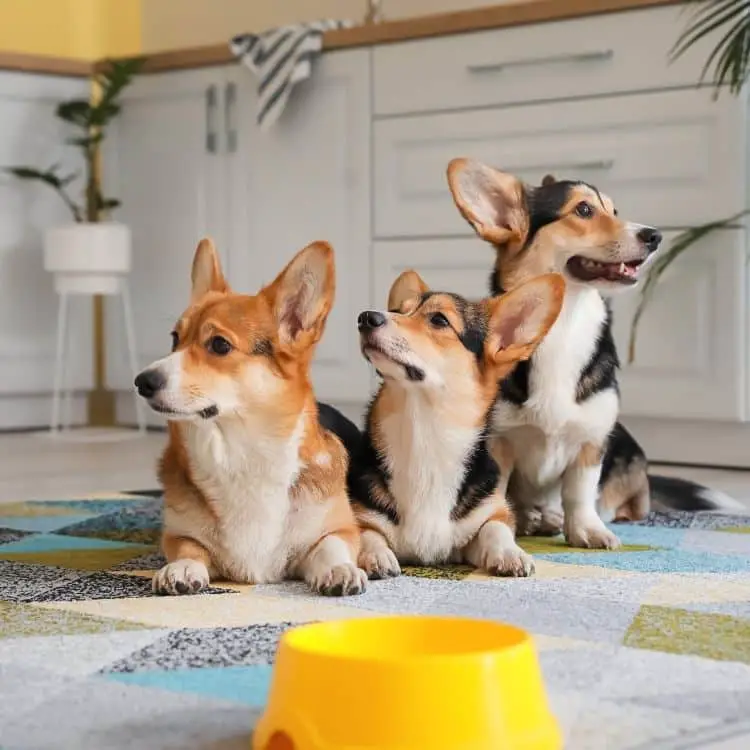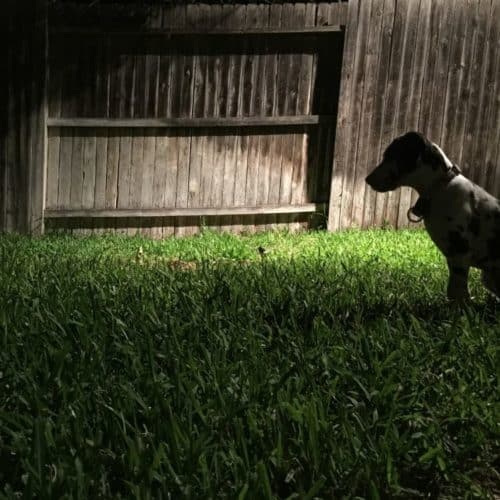Today, we are going to be talking about a phenomenon that happens to almost all dog owners at one point. That is: Dog waking up in middle of night. In this article we will cover reasons as to why this might happen. Also, we ll provide the solutions that should help in those unfortunate occurrences.
Reasons For Dog Waking Up in Middle of Night

Down below, we have listed eight of the most common reasons your dog friend might be waking you up at night. With these solutions, we hope you and your dog will soon sleep through the night with no problems.[1]
· It has excess energy
One of the most common reasons as to why dogs wake us up in the middle of the night is due to excess energy they haven’t used during the day. Therefore, make sure you exercise your dog regularly with at least a 30 minute walk every day, no matter the breed or the size of your backyard.
If your dog is a more demanding breed when it comes to exercise and energy levels, like a Labrador, a Husky or a German Shephard, you might want to consider up to couple of hours of constant physical stimulation. In case this doesn’t fit your lifestyle, hire a trainer to assist you with it.
· It needs to pee
Right beside the excess energy, comes the biological need to do the potty. This usually happens among puppies and elderly dogs, since their bladder is more often than not rather weak and uncontrollable. [2]
In this case, you should naturally let your four-legged friend go outside and do the deed, however, it is advised to keep it on a leash, in case it doesn’t need to potty, but wants to sprint instead.
This way, you’ll teach your dog that the only reason it is allowed outside in the ungodly hour, is for peeing or pooping purposes only. Although, if this occurs to your adult dog, consider taking it to the vet for a checkup.
· It hears unknown noise
Dogs are naturally extremely protective over their home and their owners. If your dog sporadically wakes up, especially when it sleeps in a different room than usual, it is probably hearing unfamiliar noise or sounds that disturbs it.
Also, make sure there isn’t anybody lurking around your house, peeking through the windows, or approaching the door because your pupper could sense an intruder sneaking around.
· It’s hungry
This could easily happen in case you are a busy person, working long hours and the dog is waiting a long time in between feeding. This is especially common amongst dogs that have recently changed their diet or the food they are eating, and if you’ve started feeding them at irregular times as to the ones it got used to.
Dogs love a routine, and if you’ve noticed your dog started waking up and whining at his food bowl, be patient and let it get accustomed to a new routine you and the vet prescribed.
· It’s ill, injured or has a medical condition
Your dog has been behaving well until suddenly, you realize, it has been showing signs of discomfort, often whining, or curling up somewhere evidently disturbed.
This has been followed by regular wake ups during the night – in that case, you probably got yourself an ill or injured dog that is trying to communicate with you and let you know it’s in pain or overcoming some physical distress.
We advise taking it to the vet, since ignoring the issue might cause a bigger medical problem in the future.
· It’s encouraged or rewarded for its behavior
Dogs learn by conditioning, so in case you’ve been giving it more attention and extra treats when it woke you up, you might have accidentally taught it that this behavior is appropriate and encouraged. The easy thing to do when a dog wakes you up without any apparent reason, other than boredom, is to give it some of the favorite toys or treats to satisfy it.
However, this will only teach your four-legged friend that this is something to do in case it wants extra attention. Make sure that’s not what happened, before taking any precautions.
· Its routine has changed
As we’ve discussed earlier, dogs are routine lovers! Therefore, when their routine is, for whatever reason disrupted, they could cause havoc. [3]
These routine changes are often unnoticeable or minor for you, like going to bed an hour early, or waking up an hour late, feeding it later at night or in the morning. In these situations, you should try moving the clock slowly, for example, one night going to bed 10-15 minutes early, and do it for couple of nights in a row.
Then, gradually moving bedtime for another 10-15 minutes and so on. This way your dog will adjust appropriately, and won’t notice a change in your routine as severely as it could.
· It has separation anxiety
Dogs tend to have separation anxiety, and during those episodes, they get distressed, sad and troubled when they sense they’ll be left alone.
Separation anxiety is basically fear of being deserted and isolated. Therefore dogs that sense it might be prone to misbehavior in order to prevent it from happening. For example, their owners going into another room to snooze.
Separation anxiety can be eased with a proper kind of approach that is best to be discussed with an animal trainer or a vet. Picking up some resourceful books from the library or bookstore is an option you’d want to consider when comforting your four-legged friend.
Let’s reevaluate!

Now that we’ve listed most probable reasons your dog is waking you up in the middle of the night, let’s emphasize the most important points.
What’s different?

When your pupper woke up for the first time during ungodly hours, what else happened that’s different than usual? Reevaluate what you or it did that day, or right before you hit the hay. Also, when it woke you up, what did it do after that, and what did you do?
Besides that, think about when does it not wake up. Try to track its sleep and realize when it’s normal and usual, versus unusual. Then try to find out what are the essential points that affect its sleeping schedule. That way you can locate and focus on resolving the issue.
What can you do?

- Establish a routine
First and foremost, make sure you follow a regular, rigid routine with little to no changes. If you must change your sleeping hours or feeding time due to work or other obligations, make sure to do so steadily and patiently, only 10-15 minutes earlier or later from the previous day.
For example, if you’ve usually gone to bed at midnight, but you’ve suddenly decided it’s best to hit the hay at 11 p.m. tops, ease your way into it. Try going to bed at 11:45 at first. Then move the clock by a few minutes every other day. That s how you let your dog get accustomed to a new routine. [4]
- Regulate its diet
Secondly, pay attention to your dog’s diet. How much food is it eating, and what food have you been giving it for the past week. Have you changed it recently? If the answer is yes, be patient and persistent, or go back to its regular diet after the consultation with a vet.
- Exercise regularly
Thirdly, make sure your dog has enough mental and physical exercise. Some breeds are more capable and intelligent than the others. That means you should try to meet the need of yours with enough stimulation it needs to feel satisfied and exercised. [5]
- Eliminate health problems
Furthermore, if the waking up is followed by whining, shivers, stiffness or odd behavior that indicates it’s in pain. So, an urgent visit to the vet is necessary. You don’t want your friend to suffer, therefore to make sure, go to a professional for a checkup.
- Tweak its schedule
If your dog is waking you up to go potty or to eat, then you’ll need to alter its schedule. For example, don’t give it too much water late at night. Also, feed it a bit later in the evening, so it doesn’t feel hungry at 3 a.m.
- Do not encourage this behavior
Lastly, do not encourage this behavior! Of course, if your dog is in great need or must have its biological need met – then yes. However, if it’s waking up just to get your attention, play or demand walks, do not engage in it. That will only create a positive reinforcement and, in the end, a habit.
Read Also: Can Dogs Eat Tapioca
Dog Waking Up in Middle of Night – Final Word
Keep in mind that this behavior is temporary. Focus on locating the issue and work your way towards a solution. In the process, ask for help from a professional to provide your puppy with the best care you possibly can.
